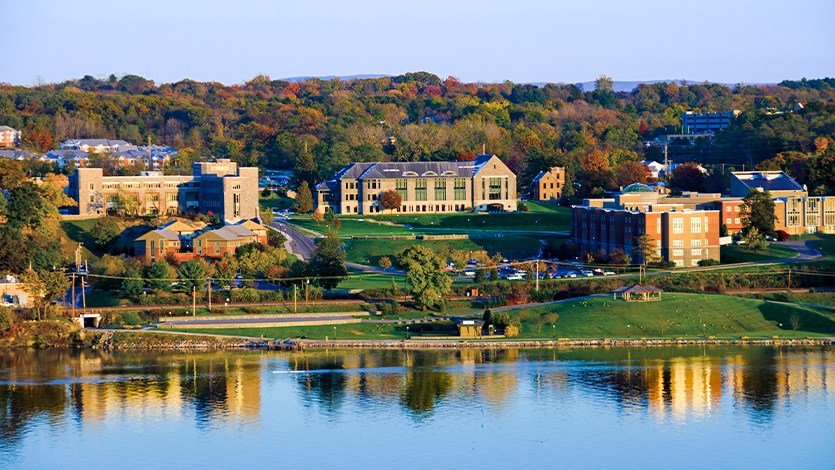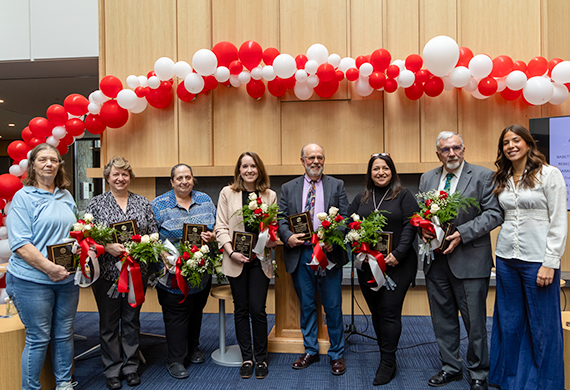Marist named among most Environmentally Responsible Colleges by The Princeton Review

November 28, 2022 – Marist College has been honored as one of the nation’s most environmentally responsible colleges, according to The Princeton Review. The education services company features Marist in its online resource, The Princeton Review Guide to Green Colleges: 2023 Edition, and schools were selected based on a survey of administrators and students at 713 colleges during the 2021-22 academic year.
The Princeton Review highlighted Marist’s longtime commitment to environmentally sustainable practices on campus, noting that the College has a Campus Sustainability Advisory Committee CSAC staffed by students, administration and faculty. The committee’s goals include educating the Marist community about the impact of their actions on the environment and establishing sustainability principles, goals and best practices. Marist is also lauded by The Princeton Review for having a sustainability-focused degree available and for the school’s substantial commitment to sourcing local and organic food on campus.
Dr. Joseph Campisi (far left) speaking to a student about the Marist College Community Garden during the 2022 Non-Profit Information Fair
“Marist College has been a leader in establishing sustainability initiatives geared to preserve and protect our community,” said Dr. Joseph Campisi, Marist Assistant Professor of Philosophy and CSAC Co-Chair. “The Campus Sustainability Advisory Committee brings students, faculty and administration together to lead the way in campus research and education that benefits the entire Marist community.”
The College is also in the process of completing a number of projects geared to make the campus greener and more sustainable. For example, solar panels are being installed on the roof of Midrise Hall and will contribute directly to the campus electricity supply. Another project underway is the installation of Electric Vehicle (EV) charging stations on campus.
“The Midrise and EV projects are in line with our commitment to implementing environmentally sustainable practices on campus,” said Justin Butwell, Marist Director of Physical Plant and CSAC Co-Chair. “The panels on Midrise will make a clean contribution to the campus power supply and the EV charging stations can serve 16 cars at a time.”
The Dyson Center project, which will create a new home for the Schools of Management and Social and Behavioral Sciences, includes a number of environmentally sustainable initiatives, including the adaptive reuse of existing foundation and structure, highly insulated walls, a high-efficiency HVAC system, a roof featuring living vegetation installed on top and enhanced air filtration.
A number of recent renovations on campus have also transitioned roofing to “green roofs,” which collect run-off water. Marist has also long participated in electronic recycling programs for students, with faculty and staff to appropriately dispose of electronic waste.
Visitors attend the Marist Fashion Program’s ‘Ethereal Sustainable Gallery’ in April 2022
Marist’s renowned Fashion Program has students and faculty actively researching ways to help preserve the environment. Sustainable initiatives include the Program’s Ethereal Sustainable Gallery and the Sustainability + Innovation Conference and the work Sustainability in Fashion students do on projects that broaden student perspectives on “responsible fashion.”
“One of the main pillars of the Fashion Program and one that many students use as the primary lens for their studies is sustainability,” said John Bartlett, Marist Fashion Program Director. “From supply chain to manufacturing, from sourcing to packaging, the importance of circularity and responsible design is top of mind and a top priority for our educators.”
Marist’s new BA program in Environmental Earth Science is paired with the MAT program, so that in 5 years Marist students can graduate ready to teach about Environmental Science in Grades 7-12. Environmental science students also engage in research opportunities to work with local partners to address environmental issues in the Hudson Valley.



